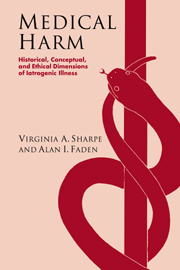Book contents
- Frontmatter
- Contents
- Acknowledgments
- Introduction
- Part I
- 1 Divided loyalties: harm to the profession vs. harm to the patient
- 2 Medical epistemology, medical authority and shifting interpretations of beneficence and nonmaleficence
- 3 Medical harms and patients' rights: the democratization of medical morality
- Part II
- Part III
- Appendix
- Bibliography
- Index
2 - Medical epistemology, medical authority and shifting interpretations of beneficence and nonmaleficence
Published online by Cambridge University Press: 22 September 2009
- Frontmatter
- Contents
- Acknowledgments
- Introduction
- Part I
- 1 Divided loyalties: harm to the profession vs. harm to the patient
- 2 Medical epistemology, medical authority and shifting interpretations of beneficence and nonmaleficence
- 3 Medical harms and patients' rights: the democratization of medical morality
- Part II
- Part III
- Appendix
- Bibliography
- Index
Summary
When Ernest Codman identified patient benefit as the ultimate standard and measure of the quality of care, he provided no explicit argumentation to justify his claim. Most likely, he saw it as self evident since his position reflected one of the most fundamental ethical commitments of medicine since the time of Hippocrates. The Hippocratic referents for the obligation to benefit the patient (beneficence) and to avoid patient harm (nonmaleficence) are found in the Oath and the Epidemics. In the Oath, the Hippocratic physician vows ‘to use my treatment to help the sick according to my ability and judgment, but never with a view to injury and wrong-doing’. and to come ‘to whatever houses I may visit… for the benefit of the sick …’ In Epidemics I, the physician is instructed to ‘make a habit of two things – to help, or at least to do no harm’.
In order to make historical sense of medical harm and the shifting interpretations of beneficence and nonmaleficence we examine the tradition of humoralism and its gradual displacement by scientific medicine in the nineteenth and twentieth centuries. We find, in each of these therapeutic traditions a paternalistic cast to the interpretation of these duties. Whereas the medical paternalism of the early nineteenth century may have been relatively unproblematic from the patient's point of view (since patient and physician had a common understanding of disorders and their treatments) the paternalism accompanying scientific medicine is grounded in the presumed epistemic authority of the physician.
- Type
- Chapter
- Information
- Medical HarmHistorical, Conceptual and Ethical Dimensions of Iatrogenic Illness, pp. 36 - 60Publisher: Cambridge University PressPrint publication year: 1998



